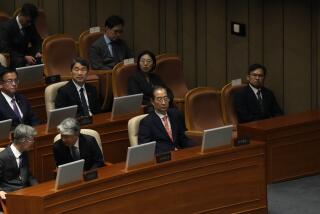Roh Thinks Twice
President Roh Tae Woo has indefinitely postponed a nationwide referendum on his leadership, and the interesting thing is that most South Koreans don’t seem to mind. Roh first promised to submit himself to a “midterm evaluation” when he campaigned last year for the presidency. Now, he says, he is concerned that going ahead with a vote would encourage radical street demonstrators to provoke more “confusion and violence.” That explanation at first glance seems like an excuse to cover Roh’s worry that he would lose a confidence vote. Yet most opposition leaders and most ordinary voters either welcome or don’t oppose this surprise decision.
Some of that could reflect a sense that Roh is more popular now than when he was elected 15 months ago with 37% of the vote. But a higher standing in the opinion polls doesn’t necessarily assure a strong vote of approval. In the last two years Koreans have been subjected to more open and intense political activity than at any time in their history. While they are pleased with the progress toward democracy their country has made, they also are showing signs of deep weariness with the process of politics. If another vote had been held soon, that fatigue might have kept a lot of probable, if unenthusiastic, pro-Roh voters at home, enough, perhaps, to jeopardize his chances to win.
Opposition parties, however, couldn’t be sure that Roh wouldn’t win his confidence vote. Their worry was that a Roh victory would enable him to claim a mandate for getting his policies through the National Assembly, despite his party’s minority position there. Helping Roh along would be the continuing failure of the three main opposition parties to find much common ground for putting across their own programs. That inability to work together in good part reflects the ambitions of the three parties’ leaders, each of whom ran for president in 1987 and all of whom intend to run again in 1992. No one wants to do anything that might give advantage to a potential opponent.
For now, then, Korean politics pretty much remains an unresolved test of wills between--and among--the ruling and opposition parties. The one thing that all sides seem to agree on is that public concern is growing over the danger to order and stability that continuing radical demonstrations pose. Roh says he called off his referendum because of that threat. Spokesmen for most of the major political parties say they accept that decision. Finally, it seems, Roh and his opponents have found something to agree on. Could this be the first sign of a new maturity in Korean politics?
More to Read
Sign up for Essential California
The most important California stories and recommendations in your inbox every morning.
You may occasionally receive promotional content from the Los Angeles Times.










